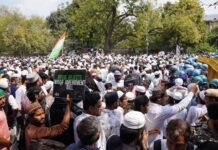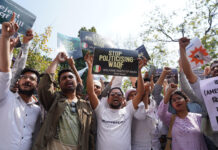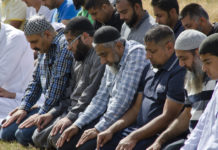At least two people have died in clashes with Indian police in the north-eastern state of Assam after thousands ignored a curfew to protest against a new anti-Muslim citizenship bill.
The Citizenship Amendment Bill (CAB) offers amnesty to non-Muslim illegal immigrants from three countries.
The bill – which applies to non-Muslims from Afghanistan, Bangladesh and Pakistan – was passed in the upper house of parliament on Wednesday night.
Critics across India say the bill is discriminatory. In the north-east, protesters claim they will be “overrun” by migrants from Bangladesh.
The ruling Hindu nationalist Bharatiya Janata Party says the CAB will give sanctuary to people fleeing religious persecution.
Assam is one of India’s most multi-ethnic states. A third of its 32 million citizens are Muslims, the second-highest number after Indian-occupied Kashmir.
Prime Minister Modi sought to reassure people in Assam, telling them they had “nothing to worry” about. “The central government and I are totally committed to constitutionally safeguard the political, linguistic, cultural and land rights of the Assamese people,” he tweeted.
Subscribe to our newsletter and stay updated on the latest news and updates from around the Muslim world!

However, with internet and mobile services shut down, it is unlikely residents would have been able to read the message.
In their petition to the Supreme Court, the Indian Union Muslim League argued that the bill violated articles of equality, fundamental rights and the right to life.
More than 700 eminent Indian personalities, including jurists, lawyers, academics and actors, have signed a statement “categorically” condemning the bill.
Meanwhile, Human Rights Watch said the Indian government’s proposed law to grant citizenship based on religion violates India’s international legal obligations.
“The Indian government’s claim that the citizenship law aims to protect religious minorities rings hollow by excluding Ahmadiyya from Pakistan and Rohingya from Myanmar,” said Meenakshi Ganguly, South Asia director. “The bill uses the language of refuge and sanctuary, but discriminates on religious grounds in violation of international law.”
HRW said the bill reflects many other policies promoted by the BJP government that favour majority Hindus at the expense of Muslims, such as the failure to properly prosecute party supporters implicated in attacks on religious minorities. The government has also deported Rohingya Muslim refugees to Myanmar despite the risks to their lives and security.
BJP politicians have also demonised Muslim immigrants and asylum seekers, including calling them “infiltrators,” to gain electoral support.
The Citizenship Amendment Bill makes irregular immigrants from Hindu, Christian, Buddhist, Sikh, and Zoroastrian communities from Afghanistan, Bangladesh, and Pakistan eligible for citizenship, but excludes Muslims.
The government makes a distinction between Muslims, who it says have immigrated illegally, and “refugees” – namely Hindus, Sikhs, Buddhists, and Jains trying to escape persecution in their country of origin.
“The Indian government is creating legal grounds to strip millions of Muslims of the fundamental right of equal access to citizenship,” Ganguly said. “The government should demonstrate its expressed commitment to protecting refugees by passing a law that protects them irrespective of their religion.”






















